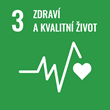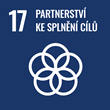Informace o projektu
Analýza Českých Genomů pro Teranostiku
(ACGT)

- Kód projektu
- CZ.02.1.01/0.0/0.0/16_026/0008448 (kod CEP: EF16_026/0008448)
- Období řešení
- 1/2019 - 6/2023
- Investor / Programový rámec / typ projektu
-
Ministerstvo školství, mládeže a tělovýchovy ČR
- OP Výzkum, vývoj a vzdělávání (OP VVV)
- PO 1 Posilování kapacit pro kvalitní výzkum
- Fakulta / Pracoviště MU
- Středoevropský technologický institut
- Spolupracující organizace
-
Univerzita Karlova
Univerzita Palackého v Olomouci
Genomac Internationals, s.r.o.
Institute of Applied Biotechnologies a.s.
CGB laboratoř a.s.
In the beginning of this millennium, a new era of human research started. First human genome followed by first individual human genomes were published. This led to the rise of genomics, a scientific field with a holistic approach, studying complete genetic information of an organism as the whole. A rapid advancement of technologies for massive parallel sequencing of nucleic acids has enabled to run projects aiming not only to obtain a whole genome sequence, but it also focusing on its interpretation. One of the first such projects was The 1000 Genomes Project, which represented a breakthrough and many international and local projects have followed up on it (gnomAD, Genomics England, deCODE, Genome Russia, Genome Asia 100K etc.). The data produced by these projects clearly demonstrate the need to obtain genomic data on the specific populations to allow them to be correctly interpreted with the respect to natural inter-individual variability. However, the current genomic data of Central and Eastern European populations (including the nationalities living in the Czech Republic) are only poorly represented in the publicly available databases. This makes very difficult for the Czech geneticists and researchers to interpret variants found in the whole genome sequence of local individuals. This can for example pose a serious issue in case of genetic diagnostics, when a non-pathogenic variant can be misinterpreted as pathogenic, because it is not commonly found in international databases, and the pathogenic variant could be overlooked. Therefore, we aim to map genetics variants in the local populations living in the Czech Republic thoroughly. Additionally, our goal is to compare them other populations. We also want to determine the presence of pathogenic alleles associated with various diseases in the Czech population in order to find out more common alleles and define the diseases with high predisposition rate. This information would be useful not only for genetic research but mainly for diagnostics of numerous diseases with genetic background including oncological, cardiological, neurological, metabolic and many others.
Cíle udržitelného rozvoje
Masarykova univerzita se hlásí k cílům udržitelného rozvoje OSN, jejichž záměrem je do roku 2030 zlepšit podmínky a kvalitu života na naší planetě.
Publikace
Počet publikací: 12
2024
-
A novel thrombocytopenia-4-causing CYCS gene variant decreases caspase activity: Three-generation study
British journal of haematology, rok: 2024, ročník: 205, vydání: 6, DOI
-
Impact of thrombocytopenia-associated c.-118C>T and c.-140C>G ANKRD26 5’UTR variants in three-generational pedigree
Platelets, rok: 2024, ročník: 35, vydání: 1, DOI
-
Non-invasive Assay for Chlorophyll Biosynthesis Kinetics Determination during Early Stages of Arabidopsis De-etiolation
Jove-Journal of Visualized Experiments, rok: 2024, ročník: 2024, vydání: 203, DOI
2023
-
Extensive, 3.8 Mb-Sized Deletion of 22q12 in a Patient with Bilateral Schwannoma, Intellectual Disability, Sensorineural Hearing Loss, and Epilepsy
Molecular Syndromology, rok: 2023, ročník: 14, vydání: 5, DOI
-
Nextflow in Bioinformatics: Executors Performance Comparison Using Genomics Data
FUTURE GENERATION COMPUTER SYSTEMS-THE INTERNATIONAL JOURNAL OF ESCIENCE, rok: 2023, ročník: 142, vydání: May 2023, DOI
2022
-
A GP1BA Variant in a Czech Family with Monoallelic Bernard-Soulier Syndrome
International Journal of Molecular Sciences, rok: 2022, ročník: 23, vydání: 2, DOI
-
Etické zásady pro používání a sdílení genomických dat z výzkumu
Časopis lékařů českých, rok: 2022, ročník: 161, vydání: 7-8
-
Very rare near-haploid acute lymphoblastic leukemia resistant to immunotherapy and CAR-T therapy in 19-year-old male patient
CLINICAL CASE REPORTS, rok: 2022, ročník: 10, vydání: 3, DOI
2021
-
Bioinformatic strategies for the analysis of genomic aberrations detected by targeted NGS panels with clinical application
PeerJ, rok: 2021, ročník: 9, vydání: MAR 2021, DOI
-
Distribution of SARS-CoV-2 Lineages in the Czech Republic, Analysis of Data from the First Year of the Pandemic
Microorganisms, rok: 2021, ročník: 9, vydání: 8, DOI

